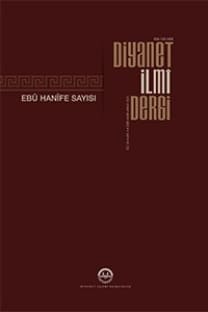GELECEKLE İLGİLİ MÜMKÜN ÖNERMELER VE ÖZGÜR İRADE: FAHREDDİN ER-RÂZÎ’NİN ARİSTOTELES’İN MANTIKSAL KADERCİLİK ÇÖZÜMÜNE YÖNELİK ELEŞTİRİLERİ
Aristoteles’e (ö. MÖ 322) göre gelecekle ilgili mümkün önermeler söz konusu olduğunda, hem çelişmezlik ilkesi korunabilir hem özgür irade savunulabilir. Râzî (ö. 606/1210), Aristo’nun iddiasını ispatlayamadığını düşünür. Çünkü Râzî’ye göre geleceğin belirsizliği epistemolojik bir belirsizliktir ve bu tür bir belirsizlik ontolojik alanda geçerli değildir. Râzî’nin mantıksal kadercilik lehine, Aristoteles aleyhine üç delili vardır: Birinci delile göre doğruluk ve yanlışlık gerçek nitelikler olduğu için onların gelecekteki taşıyıcıları da gerçektir. Gerçek olan ise belirlidir. İkinci delile göre irade mümkün fiillere taalluk eder. Geçmiş ve şimdide her şey zorunlulukla gerçekleşmiştir. Gelecekle ilgili mümkünler ise hem çelişmezlik hem üçüncü halin imkânsızlığı ilkesi gereği belirlidir. Üçüncü delile göre bu tür önermelerde referans noktası şimdi olduğunda gelecek gerçekleşmemiştir; gelecek olduğunda ise gelecek şimdiye dönüştüğü için gerçekleşen, zorunlulukla gerçekleşir. Sonuç olarak bu delillere göre geçmiş, şimdi ve geleceğe ait imkân olmadığı için iradenin taalluk ettiği bir imkân alanı da yoktur. Gelecekteki bütün olaylar; onlarda bir fazlalık, eksiklik ve değişiklik meydana gelmesi imkânsız olacak şekilde belirlidir.
Anahtar Kelimeler:
Fahreddin er-Râzî, Aristoteles, Mantıksal Kadercilik, Özgür İrade, Deniz Savaşı, Mümkün Önermeler.
FUTURE CONTINGENT PROPOSITIONS AND FREE WILL: AL-RÂZÎ’S CRITICISM ON ARISTOTLE’S SOLUTION OF THE LOGICAL FATALISM
According to Aristotle, both the principle of non-contradiction can be preserved and free will can be defended in the case of future propositions. Al- Râzî thinks that Aristotle could not prove his claim. Because, the indeterminacy of the future is an epistemological indeterminacy and that is not valid in the ontological field. While defending logical fatalism, Al-Râzî has three arguments against Aristotle: According to the first argument, since truth and falsity are real qualities, their future carriers are also real. According to the second argument, free will is related to possible actions. Everything in the past and present has happened by necessity. The future are determined by the principle of both non-contradiction and the law of the excluded middle. According to the third argument, when the reference point is now, the future has not happened; and when the reference point is the future, what happens necessarily happens because the future turns into the present. As a result, since there is no possibility in past, present and future, there is no field of possibility in which free will is involved. All future singulars; they are determined in such a way that it is impossible for any excess, deficiency or change to occur in them.
Keywords:
Fakhr al-Din al-Râzî, Aristoteles, logical fatalism, free will, sea-battle, contingent propositions.,
___
- Adamson, Peter. “The Arabic Sea Battle: al-Farabi on the Problem of Future Contingents”. Archiv für Geschichte der Philosophie 88/2 (2006), 163-188.
- Aristoteles. Categories and De Interpretatione. çev. J. L. Ackrill. New York: Oxford University Press, 1963.
- Craig, W. L. Time and Eternity: Exploring God’s Relationship to Time. Wheaton, Illinois: Crossway Books, 2001.
- Çiçekdağı, Caner. “Aristoteles’in Peri Hermeneias (Yorum Üzerine) Eserinin 9. Bölümü Üzerine Bir Yorum Denemesi: ‘Geleceğe Ait Olumsal Önermeler’” 4/8 (2015), 23-61.
- Fârâbî, Ebû Nasr el-. Kitâbü’l-İbâre. Mısır: Matbaatü Dârü’l-Kütüb, 1976.
- Hintikka, Jaakko. “The Once and Future Sea Fight: Aristotle’s Discussion of Future Contingents in De Interpretatione IX”. The Philosophical Review 73 (1964), 461-492.
- İbn Rüşd. Telhîsu Kitâbi’l-ibâre. ed. Mahmud Kasım. Kahire: Merkezü’l-Buhûsi’l-Emrîkî bi-Mısr, 1981.
- İbn Sînâ. Yorum Üzerine: İbâre. çev. Ömer Türker. İstanbul: Litera Yayıncılık, 2006.
- Karaismail, Fatma. Fahrettin er-Râzî’nin Önerme Anlayışı. İstanbul Üniversitesi Sosyal Bilimler Enstitüsü: İstanbul Üniversitesi, Doktora, 2022.
- Râzî, Fahreddin. Ana Meseleleriyle Kelam ve Felsefe: el-Muhassal. çev. Eşref Altaş. İstanbul: Klasik, 2019.
- Râzî, Fahreddin. el-Metâlibü’l-âliye mine’l-ilmi’l-ilâhî. 9 Cilt. Beyrût: Dârü’l-Kitâbi’l-Arabî, 1987.
- Râzî, Fahreddin. Mantıku’l-Mülahhas. ed. Ahad Ferâmurz Karameleki - Âdîne Asgarînejad. Tahran: Dânişgâh-ı İmâm Sâdık, 1381.
- Râzî, Fahreddin. Şerhu Uyûni’l-hikme. 3 Cilt. Tahran: Müessesetü’s-Sâdık, 1373.
- Râzî, Fahreddin. Şerhu’l-İşârât ve’t-tenbîhât. ed. Ali Rızâ Necefzâde. 2 Cilt. Tahran: Encümen-i Âsâr ve Mefâhir-i Ferhengi, 2005.
- Rice, Hugh. “Fatalism”. Stanford Encyclopedia of Philosophy (Winter 2018 Edition). ed. Edward N. Zalta. Erişim 15 Mayıs 2022. https://plato.stanford.edu/entries/fatalism/#1.2
- Whitaker, C. W. A. Aristotle’s De İnterpretatione, Contradiction and Dialectic. New York: Oxford University Press, 1996
- ISSN: 1300-8498
- Yayın Aralığı: Yılda 4 Sayı
- Başlangıç: 1956
- Yayıncı: -
Sayıdaki Diğer Makaleler
Sümeyra ARICAN, Handan YALVAÇ ARICI
İSLÂM CEZA HUKUKU HÜKÜMLERİ AÇISINDAN KANUNLAR İHTİLAFI
MESCİD-İ AKSA’DA İBADET VE KUDÜS İLE HALÎL’İ ZİYARET: FIKHÎ HÜKÜM VE TARTIŞMALAR
KUR’ÂN PERSPEKTİFİNDEN TEBLÎĞ -USÛL VE KAPSAM ÜZERİNE BAZI MÜLÂHAZALAR
KADINLARIN İSLÂM HUKUKUNA KATKILARI: HZ. AİŞE ÖRNEĞİ
İSLÂM HUKUKUNDA TERK NEDENİYLE BOŞANMANIN TÜRK HUKUKUYLA MUKAYESELİ OLARAK İNCELENMESİ
DİNİ DEĞERLERİN İLETİŞİMİNDE ÜSLUP VE GÜZEL KONUŞMANIN ETKİSİ
